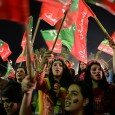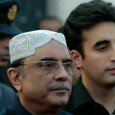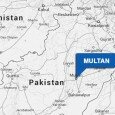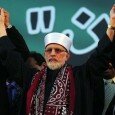By Ammar Shahbazi –
MQM finds itself standing at crossroads even at the age of 36 years
The Muttahida Qaumi Movement (MQM) is the fourth largest political party in Pakistan with a solid electoral-base in urban Sindh. Though it likes to be called an ideological party and practically runs Pakistan’s financial capital – Karachi – the MQM’s politics, over the years, has increasingly become more confused and its stand on various issues of national importance are fluid or ambiguous at best.
Critics say that its leadership, despite spending three decades in mainstream politics, has failed to shape MQM into a mature political party with a set of clear-cut principles.
Take, for instance, the MQM’s position on the current Imran Khan and Tahir-ul-Qadri led political stand-off in Islamabad: it was murky to say the least – hard to pigeonhole unlike other political parties in the parliament, who stood behind the democratic political system. The MQM was all praise for Dr. Tahir-ul-Qadri but at the same time attended the parliamentary sessions and voted in favor of democracy.
Or we can have a look at the raging debate on the creation of additional provinces in Sindh. Initially, some of it leaders demanded to carve a new province out of Sindh but later, the call was tampered down to “administrative divisions for better governance.”
Look at the party’s love-hate relationship with the armed forces. Its founding leader Altaf Hussain, in various instances, invited the army to topple the democratically-elected government but has also accused (most recently) the same forces of nursing a grudge against Mohajirs – the ethnic group that MQM claims to represent. The MQM seems to be in the right, left and center at same time.
Political analysts, however, find a method to what seems to many a series of random, provocative, spur-of-the-moment statements that has come to define the MQM’s quintessential brand of politics.
“I think it is [MQM] a focused political party which knows where its interests lie,” says Mazhar Abbas, a senior journalist who extensively covered the party’s politics since its meteoric rise in the mid-80s. “It is arguably the most organized political party in Pakistan. To an outsider, the party’s political rhetoric may seem outlandish but to its workers, who make the core of MQM, the difference between the party’s actual stand and the political rabble-rousing is clear and that’s what matters to its leadership.”
In terms of strength in the parliament, the MQM looks significant in the present provincial cabinet. But in the larger political picture, the party is not big enough to dictate its terms which, again indicates that its political ambiguity is something deliberate, which provide it with the leverage to shift its gears and extract the maximum bargain out of crises.
Abbas argues that since 1997, the MQM has aspired to become a national political party, shredding its ethnic tag and changing its name from Mohajir to Muttahida Qaumi Movement. But it has not been able to make the desired inroads into provinces like Punjab or even rural Sindh for that matter. “So the MQM knows that its political citadel is limited to urban Sindh – which comprise of Karachi and Hyderabad- so its politics revolves around wrestling for administrative autonomy in their home turf.”
He further says that despite trying for almost two decades, the MQM’s vote bank has not spread out of its core Urdu-speaking base; so there is a debate within MQM if the step to widen its horizon from a party fighting for the rights of Urdu-speaking to the one providing a platform to the middle-class people across Pakistan.
The May 2013 general elections, experts say, was a shocker for the MQM, when Imran Khan-led PTI managed to procure the second highest votes in some of MQM’s traditional constituencies like in Karachi’s district central. The insecurity was evident.
Altaf Hussain in a number of his public speeches over telephone from London, castigated and even expelled some of the top and mid-level workers accusing them of corruption and ‘not doing enough for the people,’ while shuffling his party’s on-ground-leadership. “The insecurity is understandable,” says another journalist, who wished not to be named. “The MQM knows for a fact that Karachi is all what they have got. If, for once, the city slips out of their hand, which in unlikely though, then it has nothing.”
Senior political analyst Zahid Hussain also says that the MQM’s failure to expand its voter-base beyond the Urdu-speaking people bites at the core of the party’s long years in politics. However, the insecurity that an outside may someday invades its space in Karachi is only natural. “The MQM want to remain close to its people; it wants local body’s elections, which will enable the party to deliver to its grassroots.”
Abbas believes that since the Pakistan People’s Party’s-led operation against MQM workers in 1995, the party had decided not to go at loggerheads with the government of the day. “It’s in MQM’s core interest not to earn the ire of the federal government and they know it well.”
So the MQM, with its iron grip on Karachi- the financial nerve-center of the country, is essentially a regional party with aspirations to play a decisive role in the federal government one day. But it has, at least to this day, failed to shed the tag of ethnic discriminations, which continues to dent its grander national ambitions.
The political stunts MQM undertakes through provocative statements, rallies or strikes are laced with the same undertones: more autonomy. The party basks in the knowledge that it has the power to shut down Karachi in 15 minutes’ notice, which it has. However, it wants to expand its power base further far and beyond but jealously guarding Urban Sindh- their home-base from other political forces. A tough job indeed.
To survive in such an intense political atmosphere, which is made even more interesting with the 24/7 media, one needs an abundance of humor. Who else can provide that better than the MQM’s leadership?






























































































